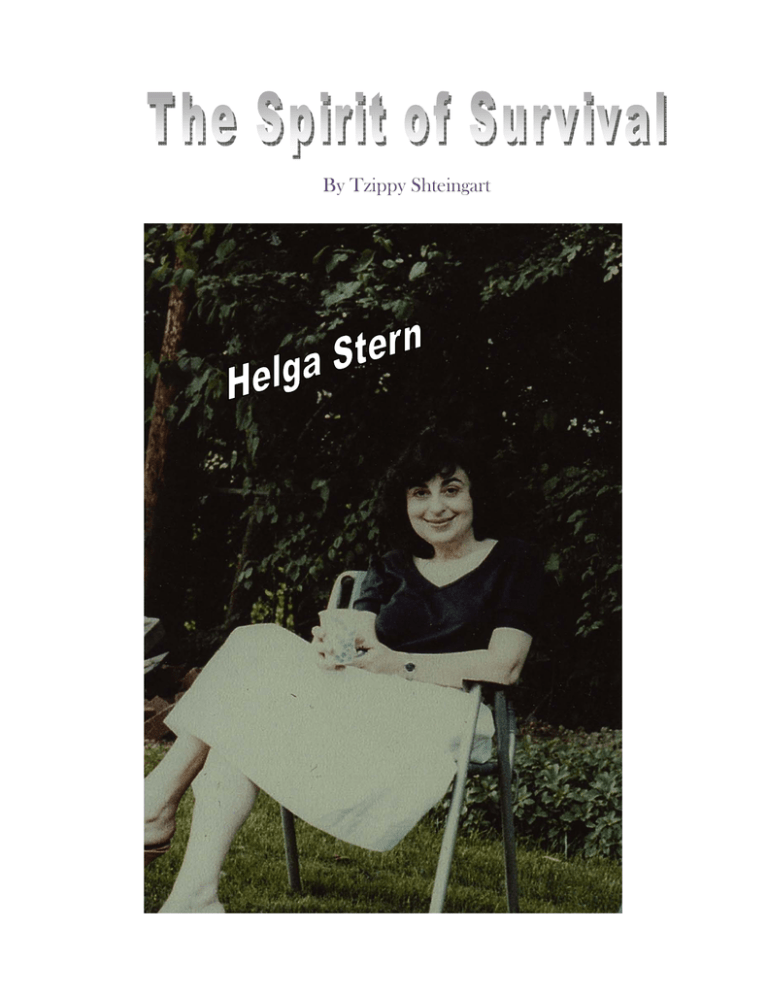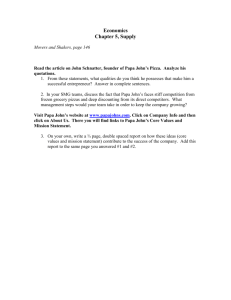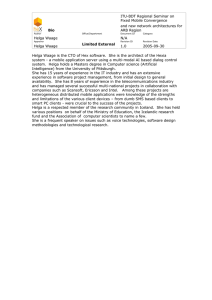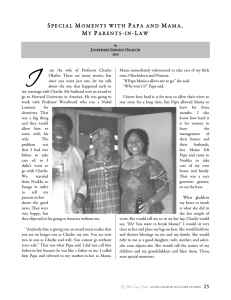By Tzippy Shteingart - Ma`ayanot Yeshiva High School for Girls
advertisement

By Tzippy Shteingart A Nightmare to Remember By Tzippy Shteingart As I interviewed Helga Stern about her story of survival, she apologized in advance to me for any nightmares her story would cause me to have… …I was eleven years old. I remember Papa and Mama discussing that we needed to leave Germany. When I awoke I saw all our bags packed and ready at the door. Mama did not even bother to take any of the pictures on the wall. I felt a sense of urgency. I remember a bumpy train ride to Belgium. What silly noises the train made. I recall unpacking our few belongings into a small flat. There was constant talk of something called Hitler. I heard of Jewish papas who never came back home. One night I remember Papa picking me up from my bed and kissing my forehead. We were walking in the street and I vaguely heard the voice of a strange man. “Here is where we cross into the free zone of France,” I heard him say. I snuggled closer to Papa’s chest and fell back asleep. I dreamed of a commotion. When I woke up, there was no more Papa. He and mama were gone… …I was eleven and a half years old. I missed Mama and Papa terribly. I heard something about them being sent to place called Drancy. Rhymed with fancy, I hoped they liked it there. I was at an orphanage. I hated the uniformed men who came to check on us every morning. They were mean and beat some of the other kids. But I liked the other grown‐ups. They were gentle and caring, and evoked a feeling of comfort. They wore yellow stars on their chests like me. One asked me if I wanted to go away and live with a nice old lady. I said yes because I was tired of having to share my food with all the other kids. I went to live with her. She did not wear a star though, and warned me to stay indoors. After a few months, she told me she could not take care of me anymore. She sent me to my aunt and uncle. …I was twelve years old. The woman had sent me on a Red Cross transport. I did not have an ID so she warned me to be inconspicuous. I knew that if I was caught I would be removed from the train and sent to Auschwitz immediately. I sat quietly in a corner and tried to make myself seem as small as possible. When they asked for ID’s, I tried not to watch as hands all around me went up holding the small rectangular card. I feared for my life, but was not caught, and gained an extra year of freedom. My aunt picked me up in to Brides les Bains, that silly name I still cannot pronounce. French people spoke funny, with an added slur to their words. There were no mean uniformed men there, at least for a little while. They showed up one night. The loud knocks woke me up and they barged in. Auntie screamed and they grabbed us all and took us to a dreadful place. I found out we were in Drancy, and it was not too fancy after all. But, at least, Mama and Papa were supposedly here. I searched all through the camp eagerly. One old man told me that most people leave on a train to Auschwitz soon after getting to Drancy. I began to fear that I would never see Mama and Papa again. Then we went to Auschwitz too… …I was twelve and a half years old. Overnight I was deprived of all my innocence. Within a twenty‐four hour period I had witnessed more atrocities than most see in a lifetime. We were shipped from Drancy in putrid smelling train cars. We were crammed into them so tightly that we nearly tripled their normal capacity. When we arrived at Auschwitz, out of the thousand of us on the train, six hundred and thirteen were picked and separated from the rest. I was disappointed at first that I could not participate in the privileged activity of this symbolic number of people. I later retched when I found out what had become of them. They had been locked in a chamber of noxious gasses and suffocated to death. The rest of us were the lucky ones, if it could be considered lucky to get our heads shaven, and numbers tattooed onto our arms. 66495. Then we were hosed down in ice cold water in the middle of the night and forced to stay awake until sunrise. Some totally inadequate rags were thrown at us to put on and we were sent off to our barracks. The board beds protruding from the walls were shared among eight of us. We fell asleep with four facing one direction and four in another. I remember cold toes prodding me all night long. I awoke to find Auntie dead next to me… …I was thirteen years old. An epidemic broke out in the camp. Dozens died daily. During the morning and afternoon censuses, people would drop to the right and to the left of me from cold and hunger. Nobody ever budged to assist them. I too developed a high fever. We were to report one morning naked to be inspected by a Doctor Mengele. He could tell that I was sick. I saw him eyeing me, with a hungry look in his eye. He had targeted me for the crematorium list and I knew it was my demise. I panicked all night, but the next morning I was not sent for. I watched as the women were lead, shrieking, to meet their horrifying fate. After that day, one Jewish woman, who had been in the camp longer than my transport, and had special supervising privileges, kept me from having to leave the barracks while I recovered. My fate was far better than the rest of those who fell ill. They were sent to the rivier (infirmary), from where they would never return. This clearly was not a place that helped people get well. Life at Auschwitz was a constant struggle for survival. There was no time to be social because all of my concentrated effort was directed at living. Thinking was detrimental. Each day we were given a quarter of a piece of bread the size of a brick and some watered down soup. This had to last us for twenty‐four hours. The soup tasted like dreadful tea, but I drank every drop for lack of better nourishment… …I was thirteen and a half years old. The Nazis were starting to panic. It was 1944 and I overheard two of them speaking of the American troops reaching Europe. In January, the Germans evacuated us because they were losing the war and did not want to leave anyone behind. The remaining of us cadaverous forms, were taken on a death march. We walked for three days and two nights. Whoever could not keep up was shot. I refused to think at all. I was in utter denial because my only chance of survival was to pretend it was not real. Thus I just persisted on robotically. “Just keep walking,” was on constant replay in my mind. All I was wearing were some flimsy rags and shoes that were far too big. Joining us on this procession were Polish political prisoners. They had had much better quarters in Auschwitz, were permitted to work in the kitchens, and were fed well, so they were stronger and in superior condition for the strenuous march than we poor Jews. They were Jew‐haters too and would shove our emaciated bodies and shout at us mercilessly. At the end of the third day, we were transferred onto open cattle cars, a journey which lasted an additional five days. We were grossly overcrowded and some people were barely standing on one leg in order to squeeze themselves in. As one of the youngest, I found it even harder to stand because my small, frail body was pushed about. Family members were trying to stick together and it was a complete survival of the fittest. Yet miraculously, I survived. The only rations we received throughout those eight days, was a quarter loaf of bread. To slake our thirst, we drank the cold snow… …I was fourteen years old. We reached Ravensbruck, another camp where we spent only one night. At this point, we were so famished that some would fight over a mere morsel of food. Among the many atrocities I saw was a woman’s head being bashed with a can for her soup portion. We were transferred to another camp and stayed there for three months. We were rapidly deteriorating because of the lack of food. The last leg of our journey was yet another two day, one night death march. At the end of the second day, we saw American soldiers coming toward us. The remaining Nazi troops had somehow managed to disappear so fast that no one even realized until they were gone. It was incredulous to me because I had never expected to be liberated… …I was fourteen and a half years old. Throughout my stay at Auschwitz, I had a friend who was like an older sister to me. Upon being freed, she told me that I was to come home with her to Belgium where her parents and family had managed to survive the war in hiding. Out of seven children, only she and her brother had been captured and taken to the camps. I lived with them for a few months and then went to a hotel set up for displaced persons in Belgium. From there, I went to England to live with an uncle, and then proceeded to live with relatives in America… …I was fifteen years old. I was enrolled in the AB Davis School in Mount Vernon. I began my “normal” life there, yet I clearly was not like everyone else. The most I could do was hide my past from my classmates, starting with the number on my arm. 66495, it mocked me wherever I went. As opposed to other places where many surviving children had gone in groups, I was alone and felt isolated… …I was twenty eight years old. I married Eli Stern, another survivor and oldest of six. He was the only survivor from his family. The rest were killed upon arriving at Auschwitz… …I was thirty five years old. My daughter asked me why she did not have a grandma and grandpa like the rest of her friends. I did not tell her the truth because I wanted to spare her the hollow feeling in her heart… …I woke up. It was only a nightmare. But for Helga Stern that nightmare was reality. Once upon a time, she thought she would be dead within a few hours. Today, she has grandchildren graduating yeshiva. With such an improbability to come out alive, Helga Stern knows that God was watching her all along the way. There were so many times that she was saved from near certain death. One time, her name was picked as part of the crematorium selection, but the same woman who kept her indoors while she was sick, removed her name from the list. It could have been anyone else’s name and yet she chose Helga’s; clearly the hand of God playing its role. Living in America in the twenty first century, I feel so secure. In my mind nothing of the kind can ever happen to me. I will never be persecuted. I will never be enslaved and stripped of all my dignity. There is too much justice where we live for that! Or is there? Helga’s first reaction when I said the word “deniers,” was one of sadness. How can people deny the truth of the Holocaust when there is proof and survivors? The American soldiers even took pictures of them upon discovering the camps. Would a whole group of Jews be sick enough to tattoo those foreboding black numbers onto their own arms? If there are those who deny the Holocaust today while survivors are still living witnesses, how will the truth be proven when there are no survivors remaining? This is why we must record their stories. This is why I write this essay. This is why every other entry is being written. No matter what happens, I have this written down and one can read it, and doubt it, but nobody can ever deny that I wrote it. Helga made an impact on me and I want to make an amplifying impact on the world. Thank you Helga Stern for giving me this opportunity to play my role in the chain of the Jewish people in helping the world remember THE SPIRIT OF SURVIVAL.



